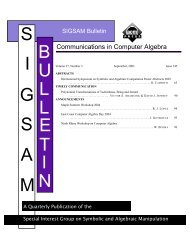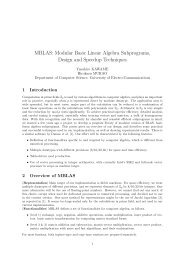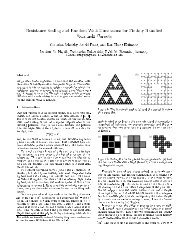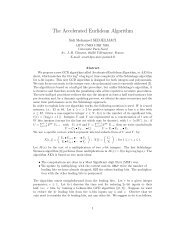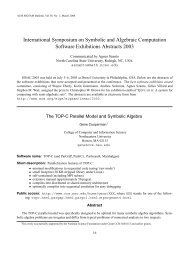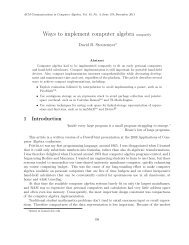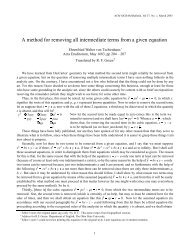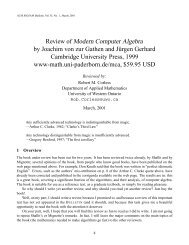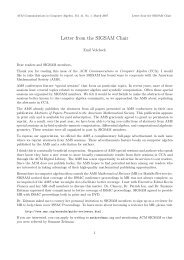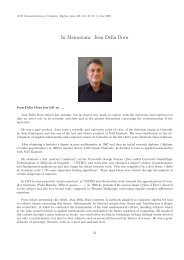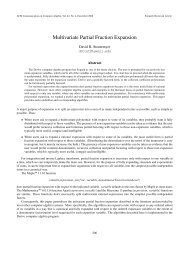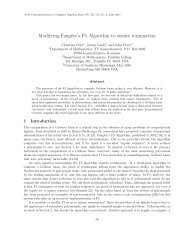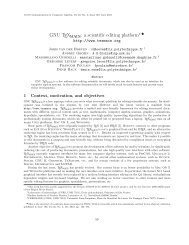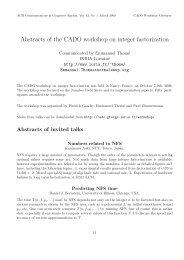Symbolic definite (and indefinite) integration: methods ... - SIGSAM
Symbolic definite (and indefinite) integration: methods ... - SIGSAM
Symbolic definite (and indefinite) integration: methods ... - SIGSAM
Create successful ePaper yourself
Turn your PDF publications into a flip-book with our unique Google optimized e-Paper software.
<strong>Symbolic</strong> <strong>integration</strong>: <strong>methods</strong> <strong>and</strong> open issues<br />
There is a bright side. After substantial bug fixing, especially in pattern matching parts of the<br />
Integrate code, Mathematica h<strong>and</strong>les more problems than in the past. Here is an example that<br />
works well due to several of transformations of the integr<strong>and</strong>. It comes from an <strong>integration</strong> test<br />
suite in [3].<br />
∫ Tan[x]<br />
r 2<br />
“ 1− ”“1− Sin[x]2 2Sin[x]2<br />
2<br />
5<br />
” dx<br />
( √<br />
[<br />
5<br />
− 4i<br />
(EllipticE<br />
3 Cos[x]2 iArcSinh<br />
√ √ )<br />
(4 + Cos[2x])Sec[x]<br />
2<br />
2 + Tan[x] 2 /<br />
[√<br />
3<br />
4.2 Out on a Limb with a Cut Branch<br />
] ]<br />
[<br />
Tan[x] , 5 − EllipticF iArcSinh<br />
5 6<br />
( √25 )<br />
+ 14Cos[2x] + Cos[4x]<br />
[√ ] ])<br />
3<br />
Tan[x] , 5 5 6<br />
Frequently we require transformations that bring into play multivalued functions. The consequence<br />
is that we may arrive at an antiderivative that is only correct up to a piecewise multiplicative<br />
constant (i.e. caused by a transformation that is 1 in some places <strong>and</strong> -1 in others, such as √ x 2 → x).<br />
Hence we now attempt to restore the proper factor. This is not always straightforward <strong>and</strong> often<br />
leads to a significantly enlarged form of result. Moreover it is not trivial to recognize in all cases<br />
how to correctly reverse effects of such transformations.<br />
4.3 Transformations<br />
In many cases it is well understood how one might obtain an antiderivative for a particular class of<br />
integr<strong>and</strong> e.g. rational functions of trigonometrics. But the needed transformations must be applied<br />
carefully in order to avoid potential explosion in intermediate complexity or that of the final result.<br />
An example of this would be ∫ x<br />
dx. Version 4 of Mathematica gives a result about five<br />
sin 2 (2x)+cos(x)<br />
times larger than what is obtained with more recent vintages.<br />
4.4 To Exp<strong>and</strong> or Not Exp<strong>and</strong>, In<strong>definite</strong>ly<br />
This is a (very important) special case of a transformation. As the issues are a subset of those that<br />
arise in the context of <strong>definite</strong> <strong>integration</strong> we cover it there instead.<br />
5 Issues in the Implementation of Definite Integration<br />
In this section we arrive at the main focus of this report. Within symbolic <strong>definite</strong> <strong>integration</strong> one<br />
encounters a wide array of issues. In the subsections below I will endeavor to present <strong>and</strong> illustrate<br />
many of them.<br />
5.1 To Exp<strong>and</strong> or Not Exp<strong>and</strong>, Definitely<br />
When one has certain types of input it makes sense to exp<strong>and</strong> over summ<strong>and</strong>s <strong>and</strong> integrate termby-term.<br />
In other cases this can be a very bad thing to do. So the question is when should one<br />
exp<strong>and</strong> the input <strong>and</strong> loop over summ<strong>and</strong>s. We will illustrate with a few examples.<br />
Here is a case where one must not exp<strong>and</strong>. The reason is that the summ<strong>and</strong>s have cancelling<br />
singularities at infinity (there is also an infinitely oscillatory, but nevertheless integrable, part at<br />
the origin).<br />
ii = ∫ ( )<br />
∞<br />
e i x − 1<br />
Sin[x] dx<br />
0<br />
6



